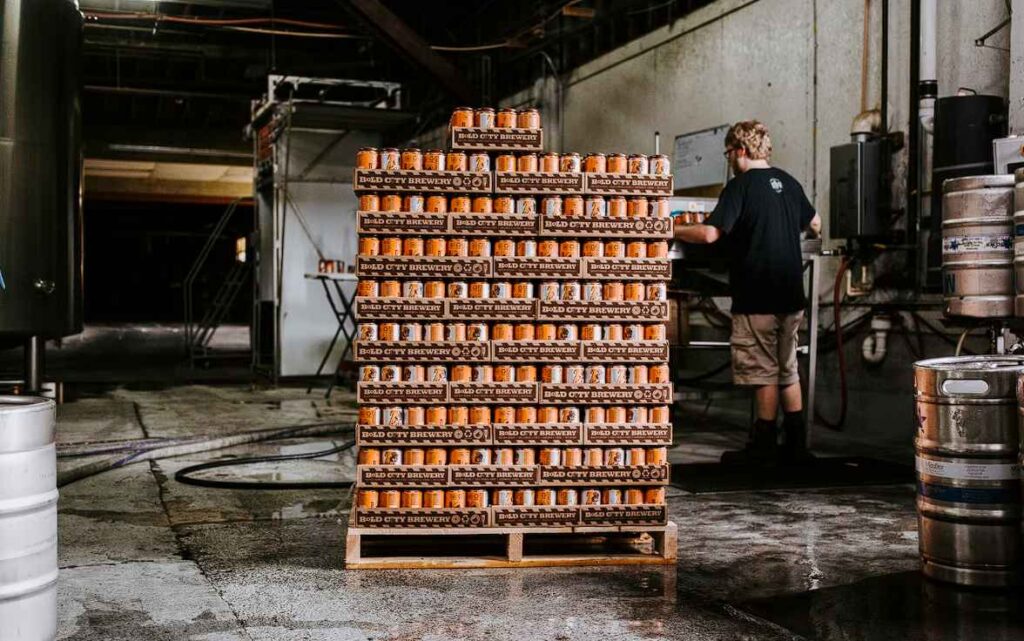If you've been considering taking the plunge and opening your own microbrewery, you're likely in search of answers to one simple question: Is owning a microbrewery profitable? After all, making beer is certainly fun, but if it can't pay the bills, then what's the point?
For a brewery to turn a profit, it needs careful planning, competent staff, and sufficient capital.
Well, if you've decided that creating craft beers specifically to fit your style is something that speaks to who you are as a brewer and someone looking for an entrepreneurial challenge–we say go for it!
In this blog post, we want to provide some insight into how profitable owning a microbrewery really is. It won't be easy, but with dedication, hard work, and maybe even a bit of luck along the way–opening a successful brewery could be incredibly rewarding.
Read on as we explore our top tips for turning your brews into bucks without sacrificing flavour or quality.
Enrich your taste journey today by coming down for an unforgettable tasting experience at Tar Barrel Mornington Brewery & Distillery!
The Timeline for a Brewery to Start Turning a Profit
In around three years, expect to see a profit. A quicker completion date would be ideal. Success at a later date is acceptable.
In those first few years, it's most important to lay a solid groundwork upon which to build. It is common for entrepreneurs to use bridge loans and other forms of private funding to get their businesses off the ground. It is common for a company to report a loss, even if its cash flow should remain consistent.
The Possibility of Profitability for a Microbrewery
Planning wisely, running smoothly, and selling your brews well can all add up to a prosperous microbrewery. However, location, competition, and market demand can all play a role in determining profitability.
Sales by glass are the most efficient way to generate revenue in the brewing industry. Regardless of the size, a tasting room is a great addition that can boost retail profits.
Income And Expenditures
The monthly costs of running the brewery will be substantial. These costs will include but are not limited to, tax, employees, infrastructure costs, and liability premiums. We must emphasise, though: costs vary by region.
Fixed-Costs
This refers to expenses that don't fluctuate wildly over time. With inflation, typical price increases are estimated at 2% annually. As seen in advertising, utilities, and upkeep, annual hikes of 10-20% are not uncommon. But they only expand in tandem with production increases.
Thus, these fixed expenditures will increase simultaneously if you're producing 100 or 1,000 barrels.
Your advertising efforts could be scaled up or down based on sales volume. Payments must be made monthly to fund this.
In contrast to actual costs, such as rent or utilities, depreciation is not paid regularly. It reflects the monthly value decline caused by age and wears on your machinery. On the balance sheet, however, it is reflected as a cash outlay.
The insurance price is constant and will probably increase or decrease at the same rate as inflation. Expect and accept that there will be some out-of-the-blue costs. The percentage they take up of overall operational costs is between 3% and 5%.
A Few Thoughts About Development
A microbrewery requires a substantial amount of room. Although production may take place in as little as 500 square feet, slightly more area would be needed for both keg storage and the actual plant.
There could be a combination of professional contractors and do-it-yourselfers involved in constructing a pub. Save money by chipping in as much time as possible when building it. Reduce the proportion of debt payments to income as much as possible.
It's likely a combination of new and used gadgets, some of which have been recycled. The loan's initial principal balance was $150,000. As much as $50,000 more could be invested privately.
Creating a Craft Brewing Company in Australia: The Necessary Steps
Craft beer is enjoying unprecedented levels of popularity and publicity in Australia. The good news couldn't come at a better time for those interested in opening a microbrewery. There is a noticeable hunger for creative flavours from independent breweries. The chances of success for a new microbrewery in Australia are high, especially if the entrepreneur approaches the establishment of their craft beer firm with preparation and forethought.
How Do I Get My Microbrewery Started In Australia?
Any new business shares many characteristics with an Australian microbrewery. A thorough business strategy is an essential first step for any startup. You can register your company's name and apply for a tax ID in a number of different countries and states. However, craft breweries must comply with more regulations beyond the norm regarding licences, excise tax, and labelling.
In Australia, the production of craft beer must meet the following precise criteria:
- A Producer/Licence wholesaler can be obtained from the Department of Alcohol, Gambling, and Racing.
- Rates of excise tax are to be calculated and paid.
- Conforming to the rules governing beer labels
If you run a craft brewery and want to serve beer on-site to the general public in a bar or restaurant, you must follow many additional regulations. One option is to:
- Microbrewery on-premises licensing process
- Obtaining permission for a commercial event
- Acquiring a Responsible Service of Alcohol licence (RSA)
- Successfully completing Licensee and Advanced Licensing Courses
Below, we'll go over each of these licence necessities in detail, including some insight into the regular expenses and prerequisites.
How To Develop A Successful Business Strategy For Your Microbrewery?
An effective business plan for a microbrewery will include broad strategic forethought, market research, and more narrowly tailored tactics tailored to the beer sector. Plan out how you'll handle the science of brewing, where you'll get your ingredients, how you'll promote your product, and how you'll stay on the right side of the law in your business plan.
The Independent Brewers Association reports that Australia is home to more than 600 independently owned and operated craft breweries (IBA). Every week and a half, another small brewery opens its doors to the public. Craft beer is becoming increasingly popular in Australia. In addition, there is a lot of competition. The first step toward running a successful microbrewery is creating a thorough and effective business strategy.
Essential Components to Include in Your Brewery Business Plan
You can start writing your business plan from scratch. The following details should be included in all business plans for microbreweries or craft breweries:
- Summary
- Mission and Vision
- Overview of a Microbrewery
- Ownership
- Studying the Market
- Strategy
- The Necessity of Regulation
- Assessment of Financial Situation
Accomplish Market Analysis
Excellent beer is only one component of a thriving craft brewing company. All new craft breweries can benefit from market research into the sector, their competitors, and their target audience. If you're starting a business in Australia, you should do some market research in the following areas:
- Customers
- Competition
- Products
- Suppliers
- Commercial Premises
- Regional Group
Also, it's wise to educate yourself about the craft beer industry:
- Study the craft brewing market.
- Talk to those who have made a success of themselves in the craft beer industry.
- Develop your understanding of brewing science.
Regulations Concerning Research
All relevant laws and rules about craft beer manufacture, distribution, sale, and labelling should be meticulously documented and accounted for in the business strategy. Moreover, it would help if you investigated the tax needs as part of your regulatory requirement investigation. Further down this page, we'll go over what craft brewers need to know about the rules and regulations that govern their industry. This is a summary, not a rulebook, for following the rules.
As the law landscape evolves, you must stay abreast of the changes and revise your company strategy accordingly. Craft beer businesses should keep their business plans fluid because laws are subject to frequent revision.
Get a Handle on the Projected Expenses.
Business plans for microbreweries, like any other small business, must include a detailed financial forecast and budget. Remember that if you want to make it in the cutthroat craft beer industry, you'll need a sound financial strategy.
Problems That Cause Breweries to Fail
Cash flow problems are the primary cause of closures. The initial investment into a new craft beer facility can be substantial, with the need for expensive equipment, a suitable location, necessary licences and permissions, and insurance.
To run a successful, well-liked, and, most crucially, reliable business that clients will desire to frequent again and again, it's crucial to have a firm grasp on the ideal methods for handling its funds.
There Is An Excessive Amount Of Rivalry.
The beer business is one of the most cutthroat in the F&B sector. Competition is more potent than ever, so it's crucial to carefully plan and finance your brewery's launch to ensure its success.
If you want your new brewery to succeed, you need to allocate enough money to cover everything from legal expenses to social media promotion, equipment rental, and more.
Failure To Establish A Strong Brand Identity
A new brewery's chances of success depend on several factors, not the least of which are the quality of its product and the level of competition in its market.
There is little point in having a perfectly on-target brewery startup cost if your brewpub fails to attract craft beer fans and generate repeat business.
You'll be in a solid position to succeed and gain an edge over the increased competition if your brewery has a different brand story and reasonable brewery startup costs.
Without A Strategy, Capital Is Not Available
Let's be honest: if you don't have a business plan, you won't have any organisation, and if you don't have any structure, you will only be able to keep your spending under control once you run out of money.
Your brewery's production efforts will continue unless you raise enough money for the initial launch phase. You know that money is king in this business. Your new microbrewery's expectations should be realistically scaled back with the help of a thorough business plan.
In addition, a business strategy for your brewery can help you map out the steps to take to turn a profit.
Entrepreneurs who waste money on unnecessary luxuries are doomed to failure. To ensure your business strategy is reasonable and practical, go to an accountant or an up-and-coming brewmaster you look up to for assistance.
A well-thought-out business plan is essential for a brewery to be successful and keep its initial costs low.
Frequently Asked Questions
Breweries have incredible profit potential – the gross profit margin on brews ranges between 74% and 92%. While breweries and taprooms do have other expenses such as food costs and additional labour, these expenses only expand your access to the thriving retail market that makes breweries so successful.
If you're serious — and not just buzzed — understand that it takes a lot of planning, money and patience to make this dream a reality. Starting a small business is already difficult, and breweries are highly capital-intensive businesses that come with additional legal and permitting requirements.
A nano brewery is the smallest type of brewery. There is no defined quantity of brewing for what establishes a nano brewery, but the most accepted definition is a brewery that produces in batches of three barrels or smaller. There are a few ways that nano breweries begin.
A nanobrewery is a smaller microbrewery. The regulations vary depending on location. A craft brewery can make up to 2 million gallons a year, but half of the beer has to be malt.
A microbrewery that produces less than 15,000 barrels of beer per year and sells 75 percent or more of its beer off-site.
Conclusion
You may transform a loss into a profit with careful planning, capable employees, and enough money. Revenues can be affected by a number of factors, including location, level of competition, and level of consumer demand. The best way for breweries to make money is through sales of individual glasses. In Australia, the craft beer industry is experiencing a wave of unparalleled success and attention. The timing of this wonderful news for individuals considering starting their own microbrewery is perfect.
As a first order of business, any new venture needs to develop a comprehensive business plan. You should plan for and be prepared to pay some unexpected expenses. In recent years, Australia has seen a dramatic rise in the consumption of craft beer. About once every two weeks, a brand new microbrewery joins the ranks of those available to the general public. A successful microbrewery business plan will incorporate extensive strategic planning and market analysis.
According to the Independent Brewers Association, Australia is home to more than 600 craft brewers that are independently owned and operated (IBA). Companies dealing in craft beer would do well to maintain a flexible business strategy in light of the regular legislative overhauls that the industry experiences. When it comes to the food and beverage industry, the beer business is one of the most competitive fields. The quality of the brewery's product and the intensity of the rivalry in the market are two of many elements that contribute to the success (or failure) of a new brewery. For a brewery to be profitable and keep startup expenditures to a minimum, it needs a well-thought-out business plan. Entrepreneurs who blow their cash on frivolous items are setting themselves up for bankruptcy.
Content Summary
- Even while brewing beer is a lot of fun, it's not worth much if you can't put food on the table with it.
- Profitability in the brewing industry requires strategic forethought, qualified employees, and adequate funding.
- We encourage you to pursue your dream of opening a brewery where you may make craft beers that reflect your individuality and taste.
- Opening a successful brewery won't be simple, but the payoff might be substantial with perseverance, effort, and, yes, a little luck.
- When a brewery can expect to start making money.
- You can anticipate a profit in about three years.
- It would be preferable if the deadline could be moved up.
- Achieving success at a later time is fine.
- It's crucial to put in the groundwork in those early years.
- Bridge loans and other forms of private investment are frequently used by entrepreneurs to launch new ventures.
- A company's loss may be expected even if its cash flow is stable.
- A successful microbrewery is the result of careful planning, efficient operations, and enthusiastic beer buyers.
- However, factors such as geography, competition, and market demand might impact earnings.
- The best way for breweries to make money is through sales of individual glasses.
- A tasting room, no matter how big or little, is an excellent investment that can increase sales.
- Monthly operating expenses for the brewery are expected to be high.
- There will be an identical increase in these fixed costs whether you produce 100 barrels or 1,000 barrels.
- According to the volume of sales, you can adjust the intensity of your advertising campaign.
- This must be financed by regular monthly payments.
- Depreciation, in contrast to real expenses like rent or utilities, is not paid on a recurring basis.
- It's a monthly reflection of the reduction in value due to age and wear on your equipment.
- It shows up as a cash outflow on the balance sheet, nevertheless.
- The cost of insurance is fixed and is expected to rise or fall at the same rate as inflation.
- You should plan for and be prepared to pay some unexpected expenses.
- They account for somewhere between 3 and 5 percent of total operating expenses.
- It is possible to produce in an area as small as 500 square feet, although keg storage and the plant itself would require slightly more space.
- It's possible that a mix of expert builders and do-it-yourselfers will work together to put together a bar.
- Spend less money on the project by helping out as much as you can throughout construction.
- You should pay down your debts as much as you can with the money you have coming in.
- That pile of electronics is probably a mix of new and used items, some of which have been recycled.
- The main amount of the loan was $100,000 at the outset.
- The other $50,000 might be invested secretly.
- In Australia, the craft beer industry is experiencing a wave of unparalleled success and attention.
- The timing of this wonderful news for individuals considering starting their own microbrewery is perfect.
- It's clear that people want to try out new, experimental beers from small, craft breweries.
- If the entrepreneur behind a new microbrewery in Australia tackles the launch of their craft beer business with careful planning and thoughtfulness, the odds of commercial success are high.
- Maintaining legality in the realm of beer labels
- Craft breweries that plan to serve their wares directly to customers in a bar or restaurant must adhere to a number of additional rules and restrictions.
- What follows is a comprehensive breakdown of all the licences you'll need, along with an explanation of the typical fees and qualifications.
- A solid microbrewery business plan will incorporate both high-level strategic planning and market research with more detailed, beer-specific techniques.
- Think out the logistics of your business, including how you will deal with the science of brewing, where you will source your components, how you will market your product, and how you will remain compliant with all applicable laws.
- About once every two weeks, a brand new microbrewery joins the ranks of those available to the general public.
- In recent years, Australia has seen a dramatic rise in the consumption of craft beer.
- Plus, there is a great deal of rivalry.
- Developing a comprehensive and efficient business strategy is the first step in managing a successful microbrewery.
- Your company strategy does not have to be perfect from the get-go.
- A successful craft brewery relies on several factors beyond just producing great beer.
- Market research into the industry, competitors, and target audience is beneficial for any startup craft brewery.
- It's also a good idea to learn more about the craft beer scene:
- Research the beer industry in detail.
- This is only a quick rundown of the guidelines; it is not the regulations themselves.
- There will be shifts in the legal climate, and your business plan will need to adapt.
- Companies dealing in craft beer would do well to maintain a flexible business strategy in light of the regular legislative overhauls that the industry experiences.
- Microbreweries, like any other type of small business, need to plan for the future by creating a comprehensive financial forecast and budget.
- Keep in mind that a successful financial plan is essential in the highly competitive craft beer sector.
- The most common reason businesses fail is that they run out of money.
- Costly machinery, a convenient site, the appropriate permits and licences, and insurance all add up to a long list of up-front expenses for a brand-new craft beer business.
- Having a good grasp on the best ways to handle the company's finances is essential if you want to run a prosperous, popular, and most importantly dependable organisation that customers will want to frequent again and again.
- There is a lot of competition in the beer industry, making it one of the most challenging in the food and beverage industry.
- As a result, it is more important than ever to carefully plan and budget your brewery's launch to increase the likelihood of its success in the face of increased competition.
- For your new brewery to be successful, you'll need to budget for a number of different things, including but not limited to legal fees, social media marketing, equipment rentals, and more.
- The quality of the brewery's product and the intensity of the rivalry in the market are two of many elements that contribute to the success (or failure) of a new brewery.
- If your brewpub can't draw in craft beer aficionados and regulars, it won't matter how low your brewery startup cost was.
- If your brewery has a unique brand story and low brewery startup expenses, you'll be in a great position to flourish and gain an edge over the rising competition.
- Lacking a plan, funding is unavailable.
- Let's be real: without a business plan, you won't have any organisation, and without structure, you won't be able to rein in your spending until you run out of money.
- Unless you can generate enough money for the brewery's preliminary launch phase, production will continue.
- You are aware that money is crucial in this industry.
- With the help of a well-thought-out business strategy, you should moderate your ambitions for your brand-new microbrewery.
- A business plan for your brewery can also assist you plot out the measures you'll need to follow in order to earn a profit.
- Entrepreneurs who blow their cash on frivolous items are setting themselves up for bankruptcy.
- Consult an accountant or an up-and-coming brewmaster you look up to to guarantee your business strategy is sensible and viable.
- For a brewery to be profitable and keep startup expenditures to a minimum, it needs a well-thought-out business plan.











